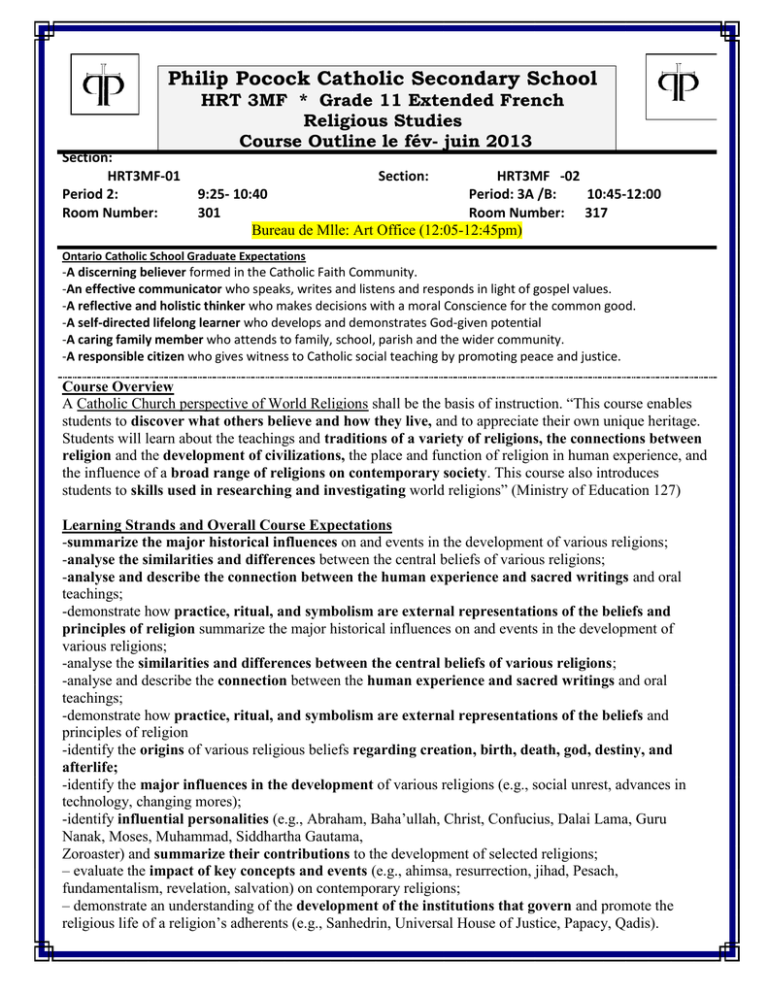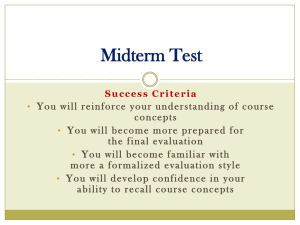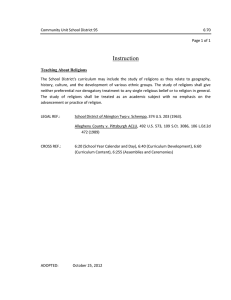Philip Pocock Catholic Secondary School Religious Studies
advertisement

Philip Pocock Catholic Secondary School Section: HRT3MF-01 Period 2: Room Number: HRT 3MF * Grade 11 Extended French Religious Studies Course Outline le fév- juin 2013 Section: HRT3MF -02 9:25- 10:40 Period: 3A /B: 10:45-12:00 301 Room Number: 317 Bureau de Mlle: Art Office (12:05-12:45pm) Ontario Catholic School Graduate Expectations -A discerning believer formed in the Catholic Faith Community. -An effective communicator who speaks, writes and listens and responds in light of gospel values. -A reflective and holistic thinker who makes decisions with a moral Conscience for the common good. -A self-directed lifelong learner who develops and demonstrates God-given potential -A caring family member who attends to family, school, parish and the wider community. -A responsible citizen who gives witness to Catholic social teaching by promoting peace and justice. Course Overview A Catholic Church perspective of World Religions shall be the basis of instruction. “This course enables students to discover what others believe and how they live, and to appreciate their own unique heritage. Students will learn about the teachings and traditions of a variety of religions, the connections between religion and the development of civilizations, the place and function of religion in human experience, and the influence of a broad range of religions on contemporary society. This course also introduces students to skills used in researching and investigating world religions” (Ministry of Education 127) Learning Strands and Overall Course Expectations -summarize the major historical influences on and events in the development of various religions; -analyse the similarities and differences between the central beliefs of various religions; -analyse and describe the connection between the human experience and sacred writings and oral teachings; -demonstrate how practice, ritual, and symbolism are external representations of the beliefs and principles of religion summarize the major historical influences on and events in the development of various religions; -analyse the similarities and differences between the central beliefs of various religions; -analyse and describe the connection between the human experience and sacred writings and oral teachings; -demonstrate how practice, ritual, and symbolism are external representations of the beliefs and principles of religion -identify the origins of various religious beliefs regarding creation, birth, death, god, destiny, and afterlife; -identify the major influences in the development of various religions (e.g., social unrest, advances in technology, changing mores); -identify influential personalities (e.g., Abraham, Baha’ullah, Christ, Confucius, Dalai Lama, Guru Nanak, Moses, Muhammad, Siddhartha Gautama, Zoroaster) and summarize their contributions to the development of selected religions; – evaluate the impact of key concepts and events (e.g., ahimsa, resurrection, jihad, Pesach, fundamentalism, revelation, salvation) on contemporary religions; – demonstrate an understanding of the development of the institutions that govern and promote the religious life of a religion’s adherents (e.g., Sanhedrin, Universal House of Justice, Papacy, Qadis). Systems of Belief By the end of this course, students will: – identify common problems and questions associated with the search for spiritual meaning; – specify the responses of some religions to these common problems and questions; – demonstrate an understanding of the concept of the supernatural in various belief systems (e.g., those of Native peoples); – describe the role of faith in systems of belief; – summarize the relationship religious symbolism has to these systems of belief in various religions; – identify significant sacred writings and/or oral teachings from various religions; – explore the origins and development of sacred writings; – compare and contrast the roles sacred writings and oral teachings have in various religions; – identify key principles from relevant passages of sacred writings and oral teachings in various religions; – examine the influence of sacred writings and oral teachings from various religions on life in modern society” (128). Practices, Rituals, Symbols, and Festivals “By the end of this course, students will: – categorize the practices and rituals of various religions (e.g., adhan, almsgiving, asceticism, atonement, anointing, covenant, sacrifice, holy days, dietary laws, vision quest); – identify the origin and significance of various practices, rituals, symbols, and festivals; – demonstrate an understanding of the role of sign and symbol in various religions” (129). Evaluation Structure (Ministry of Education 144-5) Knowledge/Understanding 25% mark -knowledge of facts and terms -understanding of concepts, principles, and theories -understanding of relationships among concepts, principles, and theories Thinking/Inquiry 25% mark -critical and creative thinking skills (e.g., decision-making skills, problem-solving skills) -research and inquiry skills (e.g., formulating questions; selecting strategies and resources’, analysing and evaluating information; forming conclusions) Communication 25% mark -communication of information and ideas -use of language, symbols, and visuals -communication for different audiences and purposes -use of various forms of communication (e.g., reports, interviews) Application 25% mark -application of ideas and skills in familiar contexts -transfer of concepts, skills, and procedures to new contexts -application of procedures, equipment, and technology -making connections (e.g., between personal experiences and the subject, between subjects, between the subject and the world outside the school) Evaluative Methods Quizzes & tests Film critiques, oral presentations Tâches (mini et finale) Course Breakdown Term Work 70% Culminating 10% Exam 20% Unitées Introduction à l`étude de grandes religions La spiritualité autochtone Les religions anciennes Le judaïsme Le christianisme L`islam L`hindouisme Le bouddhisme Le sikhisme La religion dans le nouveau millénaire Parent Communication Phone calls will be made for the following reasons... a- absenteeism b- frequent lates c- low test results d- consistently out of uniform e- incomplete homework and assignments f- poor work habits observed in class g- serious behavioural observations Ressources Le français Dictionnaire en ligne en français : www.wordreference.com Révision de la grammaire en français : bonpatron Jeux de révision concernant la grammaire en français : quia La religion Le texte pour le cours: De Bruycker, Sylvia et al. Les réligions du monde : prospective canadienne. Les Éditions de la Chenelière : Montréal, 2003. Le curriculum du programme (version anglaise) : http://www.edu.gov.on.ca/eng/curriculum/secondar y/sstudies1112curr.pdf Information générale en anglais : http://www.bbc.co.uk/religion/religions/ Le musée des religions, Québec : http://museedesreligions.qc.ca/les-grandes-religions Textbooks Textbooks are issued in excellent condition and must be returned in the same condition at the end of the course, normal wear and tear excepted. If, for any reason, a textbook or other school materials are not returned or are unusable the student is responsible for the replacement. Please note that if a textbook is not returned or a debt is not paid the Yearbook will be withheld. In addition, no further textbooks will be issued to the student until the debt is paid or the missing textbook is returned. Replacement cost: $115 Educational Excursions and Field Trips You are encouraged to participate in excursions and activities that are school or subject related. It is your responsibility to inform each subject teacher two days in advance of any trip or activity and obtain and complete any work or assignments covered during the missed periods. Missed Tests and Evaluations Teachers will give the class ample notice for up-coming tests/evaluations. It is the student’s responsibility to make alternative arrangements with the teacher before the scheduled time for the evaluation. Students will provide their teachers with at least two weeks notice of an upcoming planned absence that will cause them to miss an evaluation. If an evaluation is missed for a legitimate reason, a note from a parent must be given to the teacher indicating that the parent is aware the student has missed an evaluation no later than the day of the student’s return. An alternative date will not be during the regular class time. If an evaluation is missed as a result of truancy, a mark of zero will be assigned with no opportunity for a rewrite. Deadline Procedures The teacher will establish a deadline and an acceptance period of 3 school days following the deadline. If a student does not hand in the assignment by the deadline, a mark reduction will be applied to the assignment submitted thereafter up to a total of 10%. If the assignment is not submitted by the end of the acceptance period the student will receive a mark of zero. The teacher will accept the assignment for the purpose of providing feedback; however, a mark will not be assigned. The teacher will notify the parents/guardians if a mark of zero is assigned to a major assignment. Plagiarism Plagiarism is a serious offence. Students must acknowledge their source when using the words or the ideas of another person or group of persons for an assignment. This applies to any written or visual source. This includes books, periodicals, computers and software, art, internet etc. Cheating on class work, tests, quizzes, and exams is also plagiarism. Therefore, willful participation in any of the preceding actions will result in a zero assigned for the work. The student’s parents/guardian will be notified and a disciplinary process may be initiated. Extended Absence In the event of an extended absence due to approved situations (i.e. medical reasons, family circumstances, late registration), modification to the evaluation may be made only after consultation with the student, parent, teacher, administrator and counselor. Confirmation of Understanding Classroom Policies 1. You have a right to pass, a right to participate, a right to listen to others. 2. Have all materials and supplies (binder, textbook, writing equipment) to class 3. Adjust your voice level to suit the activity or lesson 4. Respect yourself, the teacher, and others Consequences for misbehaviour First occurrence: Name recorded. Teacher reviews expectations and directly contacts the parents. Second occurrence: Student is cautioned; teacher assigns consequence (written reflection in class) and directly contacts the parents. Third occurrence: Student is referred to the main office with their Student Profile Sheet. Fourth occurrence. Student is referred to the main office with their Student Profile Sheet. Fifth occurrence. Student is referred to the main office with their Student Profile Sheet. Parent: I have read the following syllabus for this course and I am aware of the policies and procedures for my child(ren) ________________________________ (parental signature) _____________________________ (date) Student: I have read the following syllabus for this course and I am aware of the policies and procedures for my academic success in the program. ______________________________ (student signature) ______________________________ (date)


